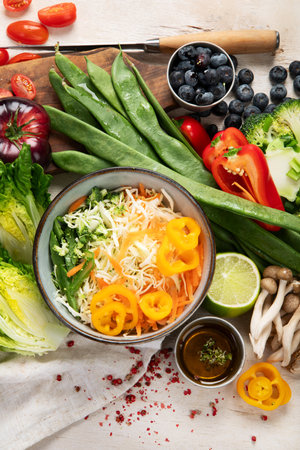Introduction to Ayurveda and Seasonal Eating
Ayurveda, a holistic system of health that originated in India over 5,000 years ago, offers gentle and natural guidance on how to harmonise our bodies with the rhythms of nature. At its heart lies the principle that what we eat should be closely connected to the changing seasons. This idea is not only rooted in ancient wisdom but also aligns beautifully with the growing trend towards local and sustainable eating here in the UK.
According to Ayurvedic nutrition, each season brings about different energies—known as doshas—that can influence our health, mood, and digestion. By adapting our meals to suit these seasonal shifts, we can support our bodies’ natural balance and resilience. In the unique climate of the UK, where weather patterns are often unpredictable and produce availability changes throughout the year, eating seasonally means making the most of what our local farms and gardens have to offer. This approach not only nourishes us physically but also connects us to the land and traditions around us, fostering a greater sense of wellbeing and belonging.
2. Understanding the British Seasons: A Modern Ayurvedic Perspective
Adapting Ayurvedic nutrition to the UK’s distinctive climate means first understanding how the traditional dosha-based seasonal guidelines can be interpreted for British weather. Ayurveda recognises three main seasons—Vata (late autumn and winter), Kapha (spring), and Pitta (summer)—each associated with specific qualities, energies, and recommended foods. However, the UK’s temperate maritime climate brings its own character to these cycles, with often unpredictable transitions and a generally cooler, wetter environment compared to India.
The table below illustrates how the classic Ayurvedic seasons might correspond to the typical patterns experienced across Britain:
| Ayurvedic Season | Traditional Characteristics | British Equivalent | Main Weather Features |
|---|---|---|---|
| Vata | Dry, cold, windy | Late autumn & winter (Nov–Feb) | Cold, damp, windy; occasional frost or snow |
| Kapha | Cool, moist, heavy | Early spring (Mar–May) | Mild temperatures, frequent rain, increased humidity |
| Pitta | Hot, intense, light | Summer (Jun–Aug) | Mild to warm; rare heatwaves; often humid rather than dry |
This modern interpretation encourages us to observe local shifts in temperature and daylight as much as calendar months. For example, spring in the UK may remain chilly well into April or May, meaning grounding and warming foods might still be suitable even as nature begins to bloom. Similarly, summer is rarely scorching but can be surprisingly humid—making cooling yet lightly spiced foods helpful for balancing Pitta without aggravating dampness.
By appreciating these nuances and integrating them into daily eating habits, we can support our wellbeing throughout the year. The key is flexibility: tuning in to both the natural world around us and our own bodies’ needs as each season unfolds.

3. Locally Grown British Foods for Each Season
Embracing Ayurvedic nutrition in the UK means celebrating the best of what each season naturally provides. By choosing locally grown, seasonal produce, you support your health and wellbeing while honouring nature’s rhythms. Here’s a guide to British vegetables, fruits, and grains that align with Ayurvedic wisdom through spring, summer, autumn, and winter.
Spring: Gentle Cleansing and Rejuvenation
As spring awakens, the body benefits from lighter foods that gently detoxify after winter’s heaviness. Ayurveda recommends favouring bitter, astringent, and pungent tastes at this time. In the UK, opt for:
- Vegetables: Asparagus, watercress, spinach, radishes, spring greens
- Fruits: Rhubarb, early strawberries
- Grains: Barley, millet
How to Enjoy:
Create light salads or gently steamed dishes using these ingredients to support liver health and encourage natural cleansing.
Summer: Cooling and Hydrating Choices
During the warmer months, Ayurvedic nutrition focuses on cooling foods to balance Pitta dosha. Look for sweet, bitter, and astringent flavours from local British produce such as:
- Vegetables: Cucumber, lettuce, courgette (zucchini), peas
- Fruits: Strawberries, raspberries, gooseberries, cherries
- Grains: Oats (soaked or cooked lightly), quinoa
How to Enjoy:
Fresh fruit salads and lightly cooked or raw vegetable dishes help keep your body cool and hydrated in the summer heat.
Autumn: Nourishing and Grounding Foods
As the air grows crisp and Vata increases, Ayurveda recommends grounding foods that are warming and nourishing. In Britain’s autumn harvest you’ll find plenty of:
- Vegetables: Carrots, beetroot, squash, pumpkins, leeks
- Fruits: Apples, pears, plums
- Grains: Brown rice, spelt
How to Enjoy:
Savour hearty soups and stews made with root vegetables and whole grains to maintain warmth and stability as daylight fades.
Winter: Comforting Warmth and Sustenance
The coldest months call for rich and sustaining foods that fuel Ojas—the vital essence in Ayurveda. Choose sweet and salty tastes with moistening qualities from local winter crops like:
- Vegetables: Cabbage, Brussels sprouts, parsnips, swede (rutabaga)
- Fruits: Stored apples and pears
- Grains: Porridge oats, buckwheat
How to Enjoy:
Bake root vegetables or prepare warming porridges with spices like cinnamon and ginger for gentle comfort throughout the chilly season.
A Final Note on Mindful Eating
Selecting local British produce in harmony with both the seasons and Ayurvedic principles helps you feel balanced year-round. Not only does this approach nourish your body according to its needs—it also connects you more deeply to the land around you.
4. Balancing the Doshas with Local, Seasonal Ingredients
When embracing Ayurvedic nutrition in the UK, one of the most rewarding practices is learning to balance your doshas—Vata, Pitta, and Kapha—using ingredients that are fresh, local, and aligned with the British seasons. Each dosha has unique characteristics and can be influenced by both the weather and the foods we eat. By tuning into what nature provides each season, you can naturally support harmony within your body and mind.
Understanding Your Dosha Needs Through the Seasons
In Ayurveda, seasonal changes influence our internal balance. For example, Vata tends to become imbalanced during windy, cold months; Pitta can flare up in summer’s heat; and Kapha often dominates in the dampness of spring. Choosing appropriate British produce helps address these shifts gently and effectively.
Choosing British Foods for Dosha Balance
| Season | Dosha Most Affected | Local Foods to Favour | Preparation Tips |
|---|---|---|---|
| Autumn/Winter | Vata | Root vegetables (parsnips, carrots), oats, apples, pears | Enjoy as warming stews or porridges; cook with ghee and gentle spices like cinnamon or ginger |
| Spring | Kapha | Bitter greens (kale, watercress), asparagus, radishes, berries | Sauté or lightly steam; add spices such as black pepper or mustard seeds to invigorate digestion |
| Summer | Pitta | Cucumbers, courgettes, lettuce, mint, strawberries | Eaten raw in salads or lightly cooked; use cooling herbs like coriander and fennel |
Nourishing Yourself Mindfully Each Season
The key to Ayurvedic eating in the UK is not only choosing seasonal ingredients but also preparing them in a way that suits your constitution. During colder months when Vata is high, opt for hearty soups made from local root veg. In springtime when Kapha rises, focus on lighter meals with leafy greens to reduce sluggishness. As summer heats up and Pitta grows dominant, choose cooling salads and refreshing drinks using local fruits and herbs.
By listening closely to both your body and the natural rhythms around you, you can craft meals that truly nourish from within—making Ayurvedic nutrition feel both accessible and deeply rooted right here in Britain.
5. Wholesome Ayurvedic Meal Ideas for UK Homes
Bringing Ayurveda into your British kitchen can be both comforting and nourishing, especially when you embrace local produce and traditional seasonal fare. Below are some simple meal inspirations that honour Ayurvedic wisdom while celebrating the best of what the UK’s fields, gardens, and markets have to offer.
Root Vegetable Stews for Grounding
During colder months, root vegetables like carrots, parsnips, and swede are abundant in the UK. Prepare a warming stew by gently sautéing these roots with fresh ginger, turmeric, cumin, and coriander. Add split red lentils or mung dal for protein and serve with steamed kale or cavolo nero. This grounding meal supports Vata balance and offers deep nourishment on chilly days.
Light Spring Green Soups
As spring unfolds, take advantage of tender British greens such as spinach, watercress, and wild garlic. Create a light soup with seasonal peas, leeks, and courgettes simmered in vegetable broth and seasoned with fresh herbs like mint or dill. This kind of meal is ideal for Kapha balancing—refreshing yet easy to digest.
Porridge with an Ayurvedic Twist
Oats are a staple in many UK homes. For a soothing breakfast, cook Scottish oats slowly with almond milk, a touch of cardamom, cinnamon, and grated apple or pear. Top with toasted seeds or nuts for extra warmth and energy. Such a porridge gently stimulates digestion while providing sustained comfort throughout the morning.
Baked Seasonal Vegetables
Baking local vegetables—think butternut squash, beetroot, or Jerusalem artichokes—with olive oil and a sprinkle of fennel seeds enhances their sweetness and makes for an easy supper. Pair with a dollop of live yoghurt and freshly chopped coriander to support digestive health according to Ayurvedic tradition.
Simple Herbal Teas
Round off your meals with homemade herbal teas using ingredients like fresh mint from the garden or dried chamomile flowers. These gentle infusions aid digestion and help you stay attuned to the seasons—an essential part of Ayurvedic living in the UK.
By blending these familiar British ingredients with mindful Ayurvedic techniques, you can create meals that are not only wholesome but also deeply supportive of your overall wellbeing through every season.
6. Gentle Lifestyle Practices to Complement Seasonal Nutrition
Adapting your daily routines to harmonise with the seasons is a core principle of Ayurvedic living, particularly in the UK’s ever-changing climate. Alongside eating seasonally, integrating gentle lifestyle practices can significantly enhance your overall wellbeing and digestive health. Begin by syncing your wake-up and sleep times with natural daylight—waking up just after sunrise and winding down as dusk falls helps balance your body’s rhythms. Gentle movement, such as a morning walk in the fresh British air or a calming yoga session, supports circulation and prepares the digestive system for breakfast.
Embrace mindful eating by setting aside time for meals, free from distractions like screens or work. In the UK, where weather shifts can influence appetite and mood, creating a cosy mealtime atmosphere—perhaps with a warm herbal tea or soft lighting—can help you relax and better absorb nutrients. Try to eat your main meal around midday when digestion is strongest, following the Ayurvedic tradition. Evening meals should be lighter and consumed at least two hours before bedtime to promote restful sleep.
Incorporate daily rituals that nurture your senses and support digestion. A simple self-massage using warming oils during colder months or lighter oils in spring and summer can boost circulation and soothe both mind and body. Sipping warm water with a slice of fresh ginger or lemon throughout the day aids hydration and gentle detoxification—a comforting habit for the UK’s cooler climate.
Lastly, adapt your routines according to seasonal changes: enjoy grounding activities like reading or journaling on long winter nights, while making the most of increased daylight in summer by spending time outdoors. By weaving these gentle habits into your daily life, you create a supportive foundation for seasonal nutrition, fostering lasting vitality and harmony within the unique environment of the UK.


